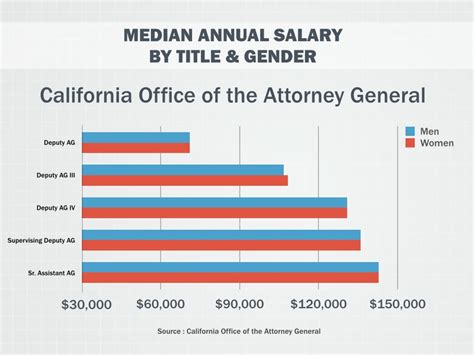For ambitious legal professionals passionate about public service, the role of an Attorney General represents the zenith of a career in law and governance. But what does a position at this level command in terms of salary? While the U.S. Attorney General's salary is a fixed figure, it sits at the peak of a broad and financially rewarding career path for government lawyers. As of 2024, the U.S. Attorney General earns $246,400 per year.
This article will not only provide the specific salary for the nation's top lawyer but also delve into the compensation structures, influencing factors, and career outlook for attorneys aspiring to high-level roles in public service, such as State Attorneys General and senior counsel within the Department of Justice.
What Does an Attorney General Do?

The title "Attorney General" exists at both the federal and state levels, and while the core responsibilities are similar, their scope differs significantly.
- The Attorney General of the United States: This is a singular, cabinet-level position. The U.S. Attorney General is the head of the U.S. Department of Justice (DOJ) and serves as the chief law enforcement officer and chief lawyer of the U.S. government. They are responsible for advising the President and executive departments on legal matters, representing the United States in legal cases of high importance, and overseeing federal law enforcement agencies like the FBI, DEA, and the Bureau of Prisons.
- State Attorneys General: Each of the 50 states and several U.S. territories has an Attorney General who serves as the chief legal officer for that state. Their duties include providing legal opinions to state agencies, representing the state in court, and enforcing state laws, particularly in areas like consumer protection, antitrust, and environmental regulation.
Average Attorney General Salary

Compensation for top government lawyers varies significantly between the federal and state levels.
The salary for the U.S. Attorney General is not determined by market forces but is set by Congress under the Executive Schedule for cabinet-level officers. According to the U.S. Office of Personnel Management (OPM), the salary for an Executive Schedule, Level I position, which includes the Attorney General, is $246,400 per year as of 2024.
Salaries for State Attorneys General are determined by state legislatures and vary widely. Data compiled by sources like Ballotpedia shows a significant range, from approximately $110,000 to over $190,000 per year, depending on the state.
For the vast majority of lawyers working in government, their salary falls within a different structure. According to the U.S. Bureau of Labor Statistics (BLS), the median annual wage for all lawyers was $145,760 in May 2023. More specifically:
- Lawyers working for the federal government earned a median salary of $159,310.
- Lawyers working for state government (excluding education and hospitals) earned a median of $104,780.
Data from Salary.com suggests that a "Government Attorney" in the U.S. typically earns between $85,000 and $215,000, reflecting the wide range from junior prosecutors to senior agency counsel.
Key Factors That Influence Salary

While the U.S. Attorney General's salary is fixed, the earnings for the thousands of other government attorneys who form the backbone of our legal system are influenced by several key factors.
###
Level of Education
A Juris Doctor (J.D.) degree from an accredited law school is the mandatory baseline for any attorney. However, for highly competitive federal positions or appointments, the prestige of the law school can play a role. Graduates from top-tier law schools often have a competitive advantage in securing clerkships and initial positions that lead to high-level government careers. Advanced degrees, such as a Master of Laws (LL.M.) in a specialized field like national security or international law, can also bolster a candidate's profile.
###
Years of Experience
Experience is arguably the most critical factor in career progression and salary for a government attorney. The path to a six-figure salary in the public sector is built on a foundation of proven legal expertise. A typical career ladder might look like this:
- Entry-Level (0-3 years): Junior prosecutors or agency lawyers often start on the lower end of the government pay scale.
- Mid-Career (4-10 years): Attorneys gain significant trial experience, take on more complex cases, and may move into supervisory roles as Assistant U.S. Attorneys (AUSAs) or senior state prosecutors.
- Senior/Expert (10+ years): With decades of experience, these attorneys become division chiefs, senior counsel, or are appointed to leadership positions, commanding the highest salaries available within the government pay structure.
###
Geographic Location
For state and local government lawyers, location is a primary driver of salary. A state with a higher cost of living and a larger budget, like California or New York, will typically offer higher salaries for its attorneys than a smaller, more rural state.
For federal attorneys, the "General Schedule" (GS) pay scale includes locality pay adjustments. This means a federal prosecutor in a high-cost city like San Francisco or Washington, D.C. will earn a significantly higher salary than a counterpart in a lower-cost area, even if they hold the same rank and title.
###
Company Type
In this context, "company type" translates to the level of government or sector. As the BLS data shows, there is a clear hierarchy:
- Federal Government: Offers the highest median salaries in the public sector due to the complexity of cases and competitive hiring processes.
- State Government: Provides competitive, stable careers but with a lower median salary compared to the federal level.
- Local Government: Salaries for city or county attorneys can vary dramatically based on the size and budget of the municipality.
- Private Sector: It is worth noting that senior lawyers in the private sector, such as partners at major law firms or Chief Legal Officers at large corporations, often earn substantially more than their public sector counterparts, with compensation frequently reaching high six-figure or seven-figure totals. However, many find the mission-driven work of public service to be a powerful non-monetary benefit.
###
Area of Specialization
Within government law, certain specializations are in high demand and can lead to more rapid career advancement. Expertise in areas like cybersecurity law, national security, intellectual property, complex financial fraud, and appellate litigation is highly valued within the Department of Justice and other federal agencies. Attorneys who develop a reputation as experts in these fields are often sought for senior advisory and leadership roles.
Job Outlook

The career outlook for aspiring attorneys remains positive. According to the U.S. Bureau of Labor Statistics, employment for lawyers is projected to grow 8 percent from 2022 to 2032, which is faster than the average for all occupations.
The BLS anticipates about 39,100 openings for lawyers each year, on average, over the decade. While competition for all legal jobs is strong, it is particularly intense for prestigious federal and state government positions. Candidates with exceptional academic records, relevant experience (such as internships with a U.S. Attorney's Office or a state AG's office), and a demonstrated commitment to public service will have the best prospects.
Conclusion

The $246,400 salary of the U.S. Attorney General is a reflection of a position at the absolute pinnacle of law and public service. While this specific role is unique, it represents the peak of a mountain that thousands of dedicated government attorneys climb every day.
For those considering a career in public law, the key takeaways are:
- Strong Earning Potential: While perhaps not reaching the heights of the private sector, a career as a government lawyer offers a comfortable living, excellent benefits, and significant salary growth, with senior federal attorneys earning well over $150,000.
- Experience is Paramount: Your value and salary will grow in direct proportion to your expertise and track record.
- Location Matters: Where you work—both in terms of state vs. federal and the specific city—will have a major impact on your compensation.
- Impactful Work: Beyond the salary, a career in public law offers the unique opportunity to shape policy, uphold justice, and serve the public good on a grand scale.
The path to becoming a top government attorney is a marathon, not a sprint. It requires dedication, a strong academic foundation, and an unwavering commitment to the principles of law. For those who embark on this journey, the rewards—both professional and financial—are substantial.
